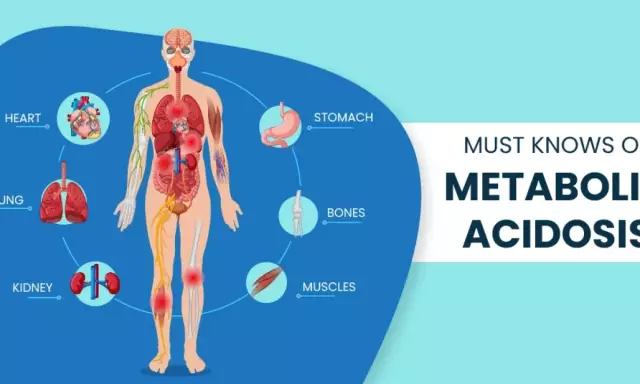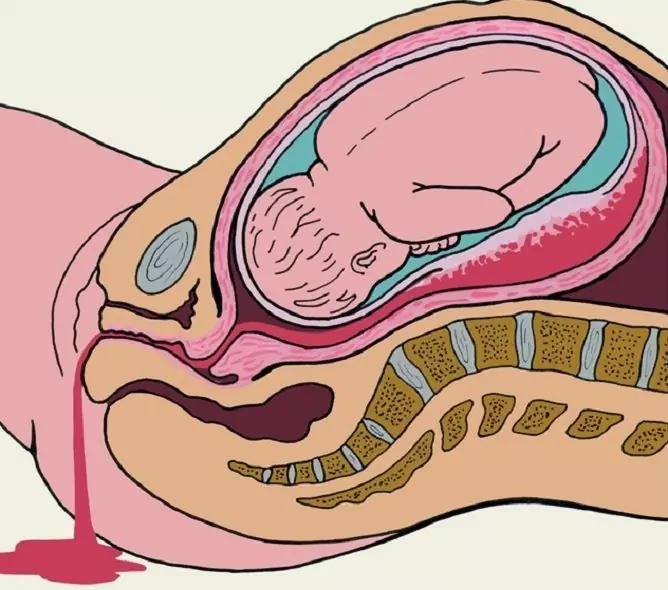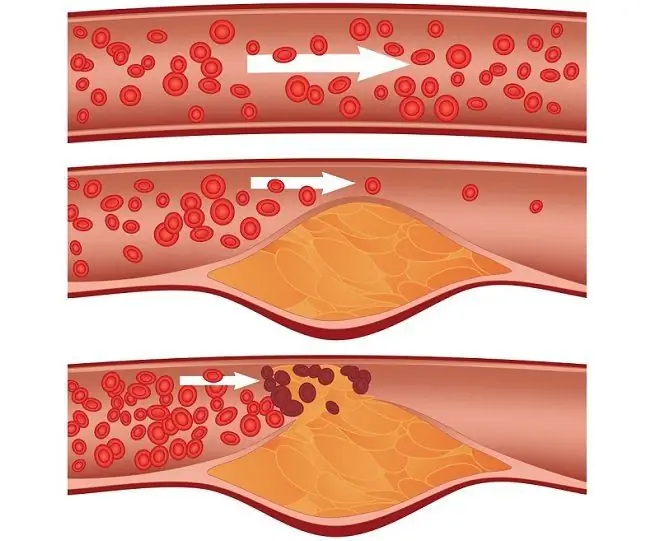- Author Rachel Wainwright wainwright@abchealthonline.com.
- Public 2023-12-15 07:39.
- Last modified 2025-11-02 20:14.
Acidosis

Acidosis is a condition of the body characterized by a violation of the acid-base balance of the body with a shift towards an increase in acidity and a decrease in the pH of its environments. The main reason for the development of the condition is the accumulation of organic acid oxidation products, which are normally quickly excreted from the body. An increase in the concentration of oxidation products of organic acids during acidosis can be caused by external factors (inhalation of air with a high concentration of carbon dioxide), as well as internal factors that are disruptions in the functioning of systems, as a result of which the metabolism of products and the accumulation of organic acid metabolites are disrupted. Severe conditions with acidosis provoke shock, coma and death of the patient.
Acidosis of any genesis can lead to critical conditions of the body:
- Dehydration;
- Increased blood clotting;
- Critical fluctuations in blood pressure;
- Myocardial infarction, infarction of parenchymal organs;
- Decrease in the volume of circulating blood;
- Peripheral thrombosis;
- Impaired brain function;
- Coma;
- Fatal outcome.
Classification of acidosis
According to the mechanisms of development of acidosis, the following types of disorders are distinguished:
- Non-respiratory acidosis;
- Respiratory acidosis (inhalation of air with a high concentration of carbon dioxide);
- Mixed type of acidosis (a condition caused by different types of acidosis).
Non-respiratory acidosis, in turn, is subject to the following classification:
- Excretory acidosis is a condition that develops when the function of removing acids from the body is impaired (impaired renal function);
- Metabolic acidosis is the most complex condition characterized by the accumulation of endogenous acids in body tissues;
- Exogenous acidosis is a state of increasing acid concentration due to the intake of a large amount of substances into the body that are converted into acids during metabolism.
According to the pH level, acidosis is classified as:
- Compensated;
- Subcompensated;
- Decompensated.
When the pH level reaches the maximum minimum (7.24) and maximum (7.45) values (normal pH = 7.25 - 7.44), proteins are denatured, cells are destroyed, and the function of enzymes decreases, which can lead to the death of the organism.
Acidosis: the causes of the development of the disease
Acidosis is not a disease. This is a condition of the body that is caused by the influence of certain factors. With acidosis, the following factors can become the reasons for the development of this condition:
- Fasting, dieting, alcohol abuse, smoking;
- Poisoning, loss of appetite, other disorders of the functioning of the gastrointestinal tract;
- Conditions of the body in which metabolism is disturbed (diabetes mellitus, circulatory failure, fever);
- Pregnancy;
- Malignant neoplasms;
- Dehydration of the body;
- Renal failure;
- Poisoning with substances, the metabolism of which in the body leads to the formation of excess acids;
- Hypoglycemia (lowering blood glucose levels);
- Oxygen starvation (in conditions of shock, anemia, heart failure);
- Loss of bicarbonate by the kidneys;
- The use of a certain number of drugs (salicylates, calcium chloride, etc.);
- Respiratory failure.
In some cases of acidosis, there are no reasons clearly indicating the development of the condition.
Acidosis: symptoms, clinical picture of the disease

With acidosis, the symptoms are difficult to differentiate from those of other diseases. In milder forms of acidosis, symptoms are not associated with a shift in the acid-base balance of the body. The main symptoms of acidosis are:
- Short-term nausea, vomiting;
- General malaise;
- Increased heartbeat, shortness of breath;
- Cardiac arrhythmias;
- Increased blood pressure;
- Disorder of the functions of the central nervous system (drowsiness, confusion, dizziness, loss of consciousness, lethargy);
- Shock states;
It should be noted that in milder forms of acidosis, symptoms may not appear at all.
Diagnosis of acidosis
For an accurate diagnosis of acidosis, the following research methods are used:
- Analysis of the blood gas composition (for the analysis, arterial blood is taken from the radial artery at the wrist, the analysis of venous blood will not accurately determine the pH level);
- Analysis of the pH level in urine;
- Analysis of arterial blood for serum electrolytes.
Blood tests for basic metabolic parameters (gas composition and serum electrolyte levels) show not only the presence of acidosis, but also determine the type of acidosis (respiratory, metabolic). Other tests may be needed to determine the cause of acidosis.
Acidosis: Treatment
Based on the fact that this condition is due to disorders in the functioning of the body systems, with acidosis, treatment is reduced to the treatment of the underlying disease, pathological condition or dysfunctions that provoked a shift in the acid-base balance of the body.
To correct metabolic acidosis, treatment involves intravenous fluids and treatment of the underlying disorder causing the condition.
In severe forms of acidosis, treatment involves the appointment of drugs containing sodium bicarbonate (drinking, infusion solutions) to increase the pH level to 7.2 and above. Sodium bicarbonate is added to glucose or sodium chloride solutions depending on circulating blood volume disorders due to acidosis.
To relieve pronounced ailments with acidosis, symptomatic treatment is prescribed. With the development of acidosis due to poisoning, treatment involves the removal of a toxic substance from the body, in cases of severe poisoning, dialysis is used.
YouTube video related to the article:
The information is generalized and provided for informational purposes only. At the first sign of illness, see your doctor. Self-medication is hazardous to health!






